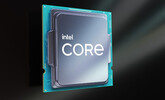Apple M3 Max 14-Core vs Intel Core i5-11400F
Apple M3 Max 14-Core
► remove from comparison
The Apple M3 Max 14 core CPU is a system on a chip (SoC) from Apple for notebooks that was introduced towards the end of 2023. It integrates a new 14-core CPU with 10 performance cores with up to 4.06 GHz and 4 efficiency cores with 2.8 GHz. There is also a more powerful 16-core variant with 40 GPU cores.
Thanks to the higher clock rates and architectural improvements, the processor performance is also significantly better than the M2 Max in benchmarks and can keep up with the fastest mobile CPUs.
The M3 also integrates a new graphics card with dynamic caching, mesh shading and ray tracing acceleration via hardware. In the cheaper model, 30 of the chip's 40 cores are used and support up to 5 displays simultaneously (internal and 4 external).
GPU and CPU can jointly access the shared memory on the package (unified memory). This is available in 36 and 96 GB variants and offers 400 GB/s maximum bandwidth (512 bit bus).
The integrated 16-core Neural Engine has also been revised and now offers 18 TOPS peak performance (compared to 15.8 TOPS in the M2 but 35 TOPS in the new A17 Pro). The video engine now also supports AV1 decoding in hardware. H.264, HEVC and ProRes (RAW) can still be decoded and encoded. Like its predecessor, the Max chip offers two video engines and can therefore encode and decode two streams simultaneously.
Unfortunately, the integrated WLAN only continues to support WiFi 6E (no WiFi 7), unlike the small M3 SoC thunderbolt 4 is also supported (max 40 Gbit/s).
The chip is manufactured in the current 3nm process (N3B) at TSMC and contains 92 billion transistors (+37% vs. Apple M2 Max).
Intel Core i5-11400F
► remove from comparison
The Intel Core i5-11400F is a fast six-core desktop processor based on the new Rocket Lake architecture, which was introduced in March 2021. The processor clocks with a base clock of 2.6 GHz and reaches an all-core boost of 4.2 GHz under load. In single-thread applications, the Intel Core i5-11400F even reaches up to 4.4 GHz. Intel also gives the Rocket Lake processors the Hyperthreading feature, which allows the i5-11400F to process up to 12 threads simultaneously. As known, the Intel Core i5-11400F is manufactured in the 14 nm process. Nevertheless, many changes have been made with the Rocket Lake architecture, which is also reflected in the performance compared to the Comet Lake. The Intel Core i5-11400F is a non-K CPU, which means that there is no freely selectable multiplier. Thus, the scope for overclocking is relatively small.
Performance
Compared to the Intel Core i5-10400F, the Core i5-11400F offers a significantly better IPC. This can be seen clearly in the single-core benchmarks. But the multi-core performance also benefits from the better IPC compared to Comet-Lake. A performance increase of up to 20 percent can be expected. The Core i5 has to do without the TVB (Thermal Velocity Boost). However, 4.2 GHz is still possible when all cores are loaded. Due to the very high single-thread performance, the Intel Core i5-11400F is best suited for video games.
Graphics
The processors marked with "F" in the nomenclature don't offer an integrated graphics unit. All other non-F processors can fall back on the Intel UHD Graphics 750 and also allow operation without a dedicated graphics card.
Power consumption
The TDP turns out relatively low with 65 watts. This is the PL1 value. For Turbo, the Intel Core i5-11400F offers a higher TDP of up to 154 watts with PL2. However, this may only be applied for a maximum of 28 seconds (dew). A good air cooler should be able to handle the resulting waste heat, so no AiO is necessary for this processor.
| Model | Apple M3 Max 14-Core | Intel Core i5-11400F | ||||||||||||||||||||||||||||||||||||||||||||
| Series | Apple Apple M3 | Intel Rocket Lake | ||||||||||||||||||||||||||||||||||||||||||||
| Series: Rocket Lake Rocket Lake |
|
| ||||||||||||||||||||||||||||||||||||||||||||
| Clock | 2748 - 4056 MHz | 2600 - 4400 MHz | ||||||||||||||||||||||||||||||||||||||||||||
| Cores / Threads | 14 / 14 10 x 4.1 GHz Apple M3 P-Core 4 x 2.7 GHz Apple M3 E-Core | 6 / 12 | ||||||||||||||||||||||||||||||||||||||||||||
| TDP | 78 Watt | 65 Watt | ||||||||||||||||||||||||||||||||||||||||||||
| Transistors | 92000 Million | |||||||||||||||||||||||||||||||||||||||||||||
| Technology | 3 nm | 14 nm | ||||||||||||||||||||||||||||||||||||||||||||
| Features | ARMv8 Instruction Set | DDR4-3200 RAM, PCIe 4, 8 GT/s bus, DL Boost, GNA, MMX, SSE, SSE2, SSE3, SSSE3, SSE4.1, SSE4.2, AVX, AVX2, AVX-512, BMI2, ABM, FMA, ADX, VMX, SMEP, SMAP, MPX, EIST, TM1, TM2, HT, Turbo, SST, AES-NI, RDRAND, RDSEED, SHA | ||||||||||||||||||||||||||||||||||||||||||||
| iGPU | Apple M3 Max 30-Core GPU | |||||||||||||||||||||||||||||||||||||||||||||
| Architecture | ARM | x86 | ||||||||||||||||||||||||||||||||||||||||||||
| Announced | ||||||||||||||||||||||||||||||||||||||||||||||
| Manufacturer | www.apple.com | ark.intel.com | ||||||||||||||||||||||||||||||||||||||||||||
| Codename | Rocket Lake | |||||||||||||||||||||||||||||||||||||||||||||
| L1 Cache | 480 KB | |||||||||||||||||||||||||||||||||||||||||||||
| L2 Cache | 3 MB | |||||||||||||||||||||||||||||||||||||||||||||
| L3 Cache | 12 MB | |||||||||||||||||||||||||||||||||||||||||||||
| Die Size | 276 mm2 | |||||||||||||||||||||||||||||||||||||||||||||
| max. Temp. | 100 °C | |||||||||||||||||||||||||||||||||||||||||||||
| Socket | LGA1200 | |||||||||||||||||||||||||||||||||||||||||||||
| $157 U.S. |


 Deutsch
Deutsch English
English Español
Español Français
Français Italiano
Italiano Nederlands
Nederlands Polski
Polski Português
Português Русский
Русский Türkçe
Türkçe Svenska
Svenska Chinese
Chinese Magyar
Magyar